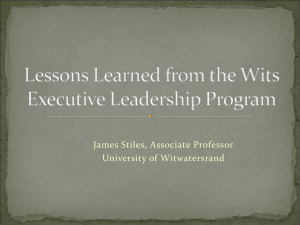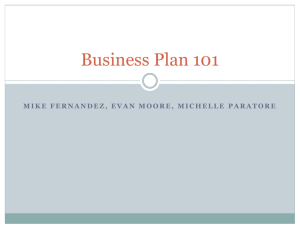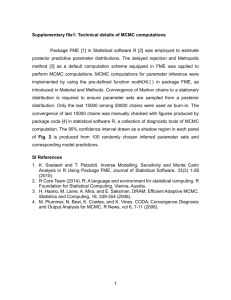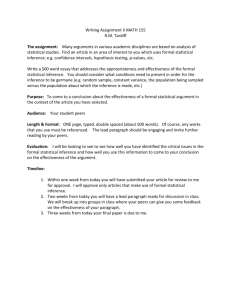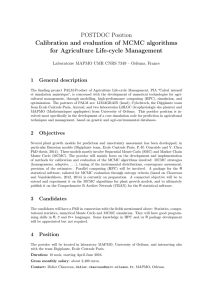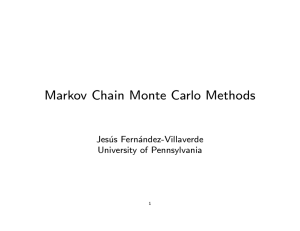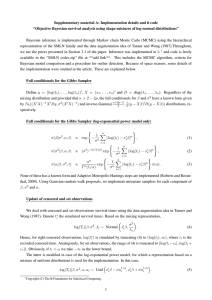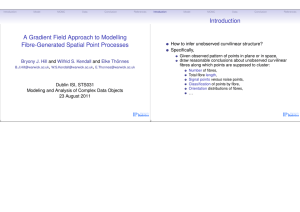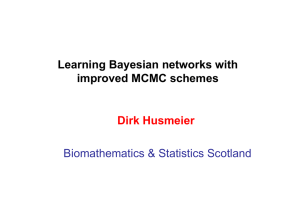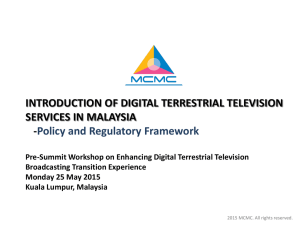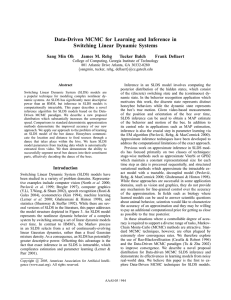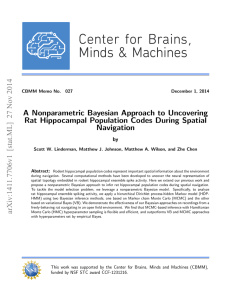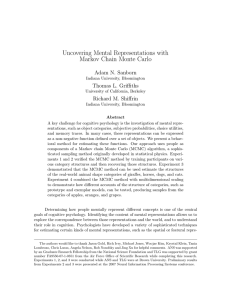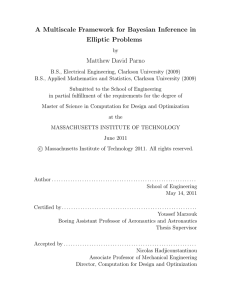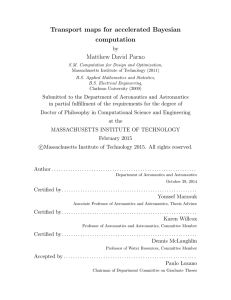cav14 - Stanford University
advertisement
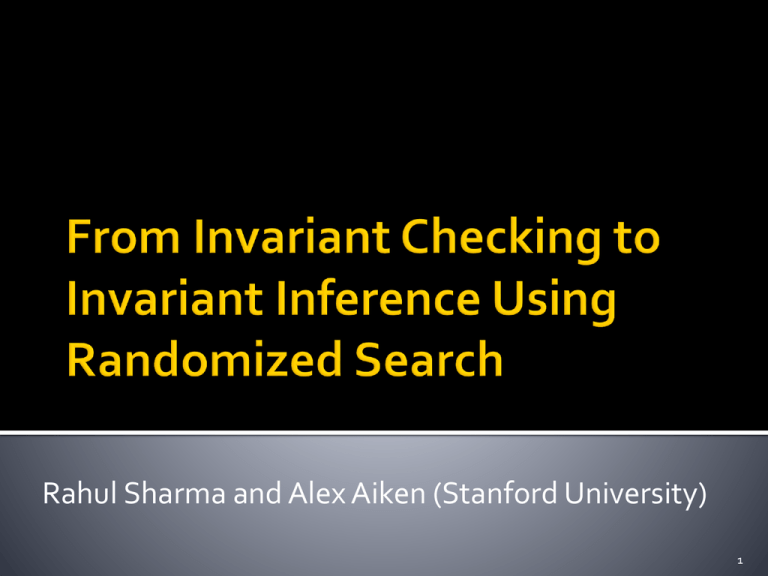
Rahul Sharma and Alex Aiken (Stanford University)
1
x = i;
y = j;
while y!=0 do
x = x-1;
y = y-1;
if( i==j )
assert x==0
𝑥=0
𝑥+𝑦 =0
⋮
𝑖+𝑦 =𝑥+𝑗
No!
Yes!
2
Numerical
Arrays
Heap
delete
PLDI08-1
NECLA-2
init
d-swap
delete-all
PLDI08-2
NECLA-3
init-nc
strcpy
find
PLDI08-3
SVCOMP-1
init-p
strlen
filter
PLDI08-4
SVCOMP-2
init-e
memcpy
last
synergy-1
SVCOMP-3
2darray
find
reverse
synergy-2
SVCOMP-4
copy
find-n
TACAS06
monniaux
copy-p
append
Strings
NECLA-1
nested
copy-o
merge
length
reverse
alloc-f
replace
swap
alloc-nf
index
substring
3
assume P
while B do
S
assert Q
Find 𝐼 that satisfies
𝑃⇒𝐼
𝐼 ∧ 𝐵 𝑆 {𝐼}
𝐼 ∧ ¬𝐵 ⇒ 𝑄
Find a valuation of unknown predicates that
makes the verification conditions (VCs) valid
4
Given a set 𝑆 of candidates
Goal is to find a candidate that satisfies the VCs
This problem is hard!
Effective domain specific approaches
Numerical, arrays, linked lists, etc.
Is it possible to have a general search procedure?
5
(Domain-specific) Checker + (General) Search = Inference
To obtain an invariant inference engine
Instantiate the search with a search space
An SMT solver to check
6
A generally applicable randomized search
Numerical, array, linked lists, and strings
Competitive performance with specialized approaches
7
Markov Chain Monte Carlo (MCMC) sampling
The only known tractable solution method for high
dimensional irregular search spaces [andrieu
03][chenney 00]
8
37
73
47
17
29
42
23
9
1.
2.
3.
4.
5.
6.
7.
𝐶 ≔ 𝑡𝑟𝑢𝑒
while( 𝑐𝑜𝑠𝑡 𝐶 ≠ 0 )
Propose a random modification to 𝐶
if cost decreased then accept
if cost increased then
with some probability accept anyway
return 𝐶
10
𝑐𝑜𝑠𝑡 𝐶 =
Problems
0
1
if 𝐶 makes VCs valid
if 𝐶 is not an invariant
Throughput < 1000 iterations per second
No incremental feedback
11
Given sets of concrete states
G: some reachable states
B: some bad states
b
g
Z: some implications
𝑐𝑜𝑠𝑡(𝐶) =
𝑔∈𝐺 ¬𝐶(𝑔)
𝑏∈𝐵 𝐶(𝑏)
𝑠,𝑡
…
+
s
I
t
Incremental feedback
+
∈𝑍 𝐶 𝑠 ∧ ¬𝐶(𝑡) +
Efficient to evaluate
12
𝑃⇒𝐶
Reachable state 𝑔, 𝐼 𝑔 = true
𝐶 𝑔 = false
𝐶 ∧ 𝐵 𝑆 {𝐶}
𝐶 𝑠 ∧ ¬𝐶 𝑡 = true
𝐶 ∧ ¬𝐵 ⇒ 𝑄
assume P
while B do
S
assert Q
Pair (𝑠, 𝑡), 𝐼 𝑠 ⇒ 𝐼(𝑡)
Bad state 𝑏, 𝐼 𝑏 = false
𝐶 𝑏 = true
13
Given G, Z, and B, for the cost function
Run search until a 0-cost candidate 𝐶 is found
𝐶ℎ𝑒𝑐𝑘 𝐶, 𝑉𝐶
SMT solver checks that 𝐶 satisfies all the VCs
If yes, then done
Update G, Z, or B and repeat
SMT solvers can generate counterexamples
If not then generate from executions
14
Program has integral variables 𝑥1 … 𝑥𝑛
Search space:
Transformations for MCMC:
10
𝑖=1
10
𝑗=1
𝑖,𝑗
𝑛
𝑤
𝑘=1 𝑘 𝑥𝑘
≤ 𝑑𝑖,𝑗
Update a 𝑤
Update a 𝑑
Update all 𝑤 ′ 𝑠 and 𝑑 of a single inequality
15
16
17
Fluid updates abstraction of DDA (ESOP’10)
∀𝑢, 𝑣. 𝑇 𝑥1 , … , 𝑥𝑛 , 𝑢, 𝑣 ⇒ 𝑓 𝑢 = 𝑔[𝑣]
Z3 fails to generate counterexamples
MCMC on this search space times out on ~30%
Restrict search space: handle each in under a second
18
Search space: Boolean combinations of atoms
Atoms are relations 𝑅(𝑥1 , … , 𝑥𝑛 )
Reachability relations
Use EPR (CAV’13) for check
19
Operations that intermix strings and integers
length(s), indexOf(s1, s2), substr(s1, i1, i2), …
Search space: Boolean combinations of predicates
Z3-Str (FSE’13) for check
20
Static invariant inference is a hard problem,
made easier by separating search and check
Search based techniques can work
Competitive with other methods
Easier to retarget to new domains
Future work, scale MCMC to full program proofs
21
Pranav Garg, Christof Löding, P. Madhusudan, Daniel Neider: ICE: A Robust
Framework for Learning Invariants. CAV 2014
Shachar Itzhaky, Nikolaj Bjørner, Thomas W. Reps, Mooly Sagiv, Aditya V. Thakur:
Property-Directed Shape Analysis. CAV 2014
Rajeev Alur, Rastislav Bodík, Garvit Juniwal, Milo M. K. Martin, Mukund
Raghothaman, Sanjit A. Seshia, Rishabh Singh, Armando Solar-Lezama, Emina
Torlak, Abhishek Udupa: Syntax-guided synthesis. FMCAD 2013
Ashutosh Gupta, Rupak Majumdar, Andrey Rybalchenko: From tests to proofs.
STTT 15(4) (2013)
Yungbum Jung, Soonho Kong, Bow-Yaw Wang, KwangkeunYi:
Deriving Invariants by Algorithmic Learning, Decision Procedures,
and Predicate Abstraction. VMCAI 2010
Sumit Gulwani, Nebojsa Jojic: Program verification as probabilistic
inference. POPL 2007: 277-289
22


